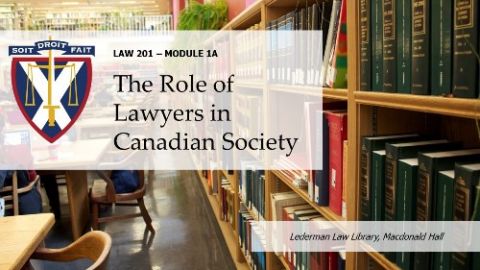
It’s become a mainstay for Queen’s undergrads curious about the law – and now LAW-201 is spreading its virtual wings, as the online course becomes available to undergraduates across Ontario.
Following a “refresh” of the course, with a new template and graphics for its modules, the program is now being offered through the Ontario Online Initiative’s eCampus Ontario portal (http://ecampusontario.ca/). This means that undergrads from across Ontario can take the course through the portal, making it easy to register and to earn course credit at their own university without the need for special permissions or letters from their faculty. All of this completely online, with video modules as lessons and embedded tests and discussion forums providing grading and interaction.
“Use of online instruction for the summer course is an important innovation – one that has been well-received by Queen’s undergraduate students who were offered this option last summer,” says Professor Nick Bala, Law’77, one of LAW-201’s instructors since its inception three years ago as a Queen’s-only course.
The course is a comprehensive survey of Canadian law taught by Queen’s Law faculty, covering the basics in a number of fundamental areas – constitutional, criminal law, property, torts, family law and business law, as well as offering an introduction to case law. Nine modules, broken down into three or four ‘submodules,’ cover both broad legal concepts and provide specific, examples of the “law in action.”
Bala, a faculty member since 1980, is teaching Family Law, one of the largest modules in the course, and sees great value for both future law students and undergraduates in general. “It may increase students’ interest in the law, and encourage applications to law school,” he says, “but even if this is the only law course they ever take, it still provides very important insights into the legal system in Canada.”
Bala – whose tenure as a professor stretches back to “when we thought we were lucky to have a photocopier” – emphasizes that while the online and asynchronous elements of the course are important, the human element is still essential. “Offering this in the summer, when our students are literally in different places around the world and on different schedules, means having classes ‘meet’ at the same place and time isn’t feasible. There’s a lot of value in this flexibility.”
The course itself has been redesigned for Summer 2016, featuring upgraded visuals and illustrations for core concepts, as well as pictures of the Queen’s campus and the law building itself – serving as a “virtual tour” of the law school for the students taking courses from the Faculty there. While seeing the school, and students, through the course fosters a sense of “place” with those taking LAW-201, Bala feels that it’s the interaction with the people on the other side of the screen that provides a lot of the value.
“There is still human contact, and important contact, through our teaching assistants, under the guidance of the course supervisor. The TAs, all upper-year law students at Queen’s, have an important role in ensuring that the LAW-201 students have regular, meaningful personal contact,” he explains. “And I think that the TAs are also learning more about the law, by being able to articulate and teach it to undergraduates.”